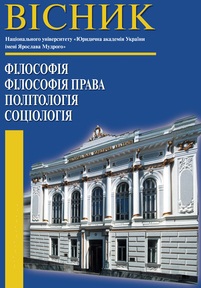ДО ПИТАННЯ ПРО ОНТОЛОГІЧНІ ЗАСАДИ ПРАВОВОГО ЖИТТЯ: ДОСВІД ФЕНОМЕНОЛОГІЧНОГО ОСМИСЛЕННЯ
ON ONTOLOGICAL FOUNDATIONS OF LEGAL LIFE: EXPERIENCE OF PHENOMENOLOGICAL REASONING
Author(s): Inna Igorivna Kovalenko, Eduard Anatoliyovych KalnytskyiSubject(s): Phenomenology, Philosophy of Law, Ontology
Published by: Національний юридичний університет імені Ярослава Мудрого
Keywords: social cognition; non-classical law awareness; legal ontology;
Summary/Abstract: Problem setting. Contemporary multi-vector socio-philosophical studies of the phenomena and processes of legal life imply the involvement of new cognitive abilities. Phenomenology as the methodological grounds of integrative legal awareness enables to expand the limits of law understanding. In addition, phenomenology implies transition into the field of multi-dimensional law description, where it appears as a real legal world or legal life, focuses on researching valid law, seeking legal bases in human existence. Addressing theoretical capacities of phenomenology makes it possible to find the sources of the specific reality of law, show object denotation and existential sense of law as regional ontology.Recent research and publications analysis. In modern social philosophy there are a number of works devoted to law studies within the paradigm of non-classical rational- ity. Nevertheless, though phenomenological methodology is used rather actively, domestic philosophy of law is not yet rich in the surveys, enabling, in particular, to find out the features of ontological foundations of legal life as the law sense configurate.Paper objective. The study of ontological foundations of legal life by distinguishing between two interrelated forms in the integral legal life: law structure and law process.Paper main body. The paper considers the interrelation of structural and procedural features as the forms of legal life.Essentially, the following arguments are provided: the source of conceptual and ac- tual factual integrity of the legal life structure and process is a legal entity, and its institutionalized activity aimed at supporting or changing the social order, ensures the reproduction of legal structure; legal activity of the entities is in the form of legal relations and legal communication; since the legal process is a discrete totality of continuously changing phenomena of legal consciousness and institutions, each of them naturally conforms to a specific level of hierarchical organization of legal life; legal structure performs two functions for legal process: selective function, aimed at inclusion/exclusion of facts and events of legal life into the legal process, and differentiation, or distinctive, function of its formal and essential realities.Functionally, proving the thesis on the integration of structure and process as the forms of legal life imply that the difference between these features is manifested in the fact that the law structure and law process do not coincide in norm description coding. Therefore, it was demonstrated that the law, considered from the viewpoint of its structural properties, is designed to record tension in the society and reduce the complexity to «normal» state. The law process activates senses of legal life, but it does not accumulate the knowledge of potential normative conflicts thus not preventing them.Further analysis of the law structure and law process referred to the given rules or codes, organizing their interpretation. It was shown that in the law structure the code ap- pears to be identical to the logical scheme of the procedure of establishing the fact of le- gality/illegality. In the law process, especially under the conditions of devaluating rule-of- law principles, legality/illegality code is substituted with the code of involvement/non- involvement in governmental institutions and the sources of wealth distribution.The third feature is related to the specifics of the law structure and law process influence on public development. It was found that if the law process is the key factor of positive and negative changes in the society, the law structure may either promote or impede its development.Conclusions of the research. Thus, the integral whole of the law structure and law process means their essential unity despite functional differences: law structure is procedural and law process generates invariant combinations of elements as various structures.
Journal: Вісник НЮУ імені Ярослава Мудрого. Серія: Філософія, філософія права, політологія, соціологія
- Issue Year: 38/2018
- Issue No: 3
- Page Range: 80-95
- Page Count: 16
- Language: Ukrainian

